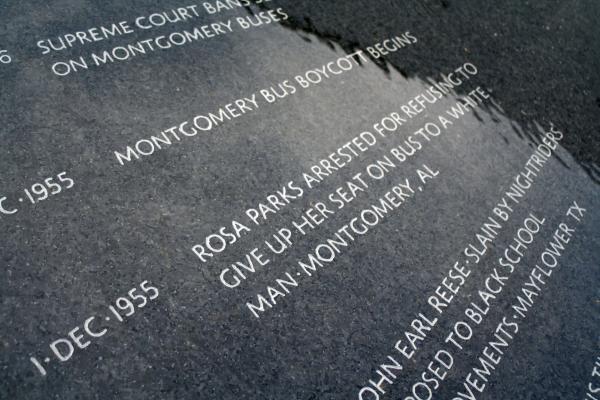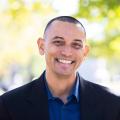A Note from Jim Wallis: I am absolutely delighted that Adam Taylor has returned to Sojourners, now as our new Executive Director. He has gained a wealth of experience through his time at the White House, World Vision, and the World Bank, and now comes back to Sojourners to help lead us into the future. I’m grateful for the way in which Adam remained deeply connected and committed to our mission during these years while serving on the Board, most recently offering his leadership as the Chair.
Adam will work directly with me and will oversee our campaigns and a renewed effort to strengthen the church’s capacity to engage in advocacy and mobilization, as well as enhance and broaden Sojourners’ engagement and solidarity with social justice and human rights causes around the world. Adam is helping to lead a new generation of young people who are vitally connecting faith and politics — and no one does it better. I am especially grateful for his passion for racial and economic justice as a direct consequence of his faith and for his sense of the urgency of this moment. Welcome, Adam.
After almost a decade since I last served as the Senior Political Director at Sojourners, I am honored to return to staff as the new Executive Director. In many ways, it feels as though I never truly left as I’ve had the privilege of serving on the Board for most of these interim years and most recently as Board Chair for the past three years. I have long been grateful for Jim’s ongoing friendship and mentorship and for the regular doses of inspiration that I’ve received from reading the magazine and online platform. After a great deal of prayerful discernment, it became increasingly clear that Sojourners’ mission and community was where I feel I can best live out my sense of vocation and calling.
In this new role, I hope to bring greater clarity and urgency to Sojourners' long-standing work of inspiring and empowering people to put their faith into action. This work feels even more imperative for such a time as this when the soul of our nation and the very witness of the church is imperiled and tested.
I return to Sojourners inspired by the courage and boldness of a new generation of young activists. The protests and activism of the Black Lives Matter movement has forced the issue of racialized policing and police violence onto the public agenda. Student survivors of the horrific massacre at Marjory Stoneman Douglas High School this past Ash Wednesday continue to speak out with such moral clarity about the need to address the fraudulent and pernicious state of gun violence in our nation. Dreamers are reframing the narrative and debate around immigration with their personal testimonies and bold advocacy to expand opportunity and justice, not simply for themselves but for all immigrants in this nation. It is time for older generations (including my own) to redouble their commitment and demonstrate pragmatic solidarity with these and other young people who are putting their lives and futures on the line. You can support and amplify the urgent call of students to end gun violence by participating in the March 18 #ThoughtsPrayersAction Sunday to end gun violence. There are also concrete tools and opportunities for churches to work together to end to racialized policing and protect immigrants from mass deportation through the Matthew 25 campaign.
I return to Sojourners believing our nation and the world need the moral and prophetic voice of the church. It has been painful to watch the gospel be hijacked and betrayed by the seemingly unconditional support of far too many Christians of a president whose leadership has been steeped in bigotry, narcissism, misogyny, xenophobia, deceit, and disregard for the rule of law. The pledge to “Make America Great Again” is coded language for making America white again — and “America First” fuels a misguided and dangerous isolationism and nationalism. I have the audacity to believe that at its best the church is both a balm that heals many of our most intractable divisions as well as a vehicle that challenges and changes hearts and minds to pursue the common good and prioritize the disinherited. The church must be the conscience that changes the very temperature of society.
I return because I have been haunted by the insightful words of my then 6-year-old son, who woke my wife and I up at 3 a.m. on the morning after the 2016 election to ask us about the results. He then proceeded to ask the innocent but searing question: “How could our country elect someone who has said such bad things?” This was one of the few moments that I have been speechless. When I think and pray about the state of our nation in which my two black sons are growing up in and the world they will soon inherit, I’m filled with trepidation and anguish.
This year marks the 50th anniversary of Dr. Martin Luther King’s tragic assassination in Memphis while supporting sanitation workers who were demanding a living wage and dignity. An array of events — including the Unite to End Racism march — are being planned in Memphis, Washington, D.C., and around the country to remember his death and to reclaim the breadth and depth of his legacy. This anniversary is particularly poignant and important for own life because 1968 marks the year that my black mother and white father made the controversial decision to marry. I grew up believing that I was born in the wrong era. I idolized and even romanticized the civil rights struggle and often felt exasperated with my own Generation X for often taking for granted the struggles for freedom and justice that came before us. I have tried over my career to recreate a similar sense of urgency and activism around what I see as the unfinished business of this movement — whether it’s the grave inequities in our education system or mass incarceration or the quicksand of poverty in America.
One compelling and consistent theme of Dr. King’s public theology and activism that holds a key to our future is his vision of the beloved community. As Dr. King so eloquently defined it:
“Love is creative and redemptive. Love builds up and unites; hate tears down and destroys. The aftermath of the ‘fight with fire’ method which you suggest is bitterness and chaos, the aftermath of the love method is reconciliation and creation of the beloved community.”
The beloved community is a community in which people of different backgrounds recognize that our individual well-being is inextricably linked to the well-being of others. It is a society based on justice, equal opportunity, empathy, and love. In a similar spirit, I define the beloved community as a society in which neither punishment nor privilege is tied to race, ethnicity, gender, or sexual orientation and where our diversity is celebrated and embraced as a source of our strength and prosperity.
Now is the time to be creatively maladjusted to the world around us. But we can’t simply withdraw or bask in our self-righteousness; we must be agents of kingdom transformation. This is not a time to remain idle or passive when our nation’s character is being so denigrated and too many politicians have shown such craven and feckless leadership.
Lent is a season in which Christians are called to search ourselves and repent for everything that separates us from God. In this season we must ask ourselves, what idols occupy our attention and distract us from God’s holy, pleasing and perfect will? Lent forces us to examine to whom do we give our first loyalty and allegiance — our Lord and Liberator Jesus Christ or a political party, a president, or even a particular denomination or tribe within the church? Lent is a season in which we must reorder our steps so they follow in Christ’s steps of justice, righteousness, and steadfast love.
As I sojourn with you, I’m anxious to listen and learn from you as we work tirelessly to encourage and inspire a greater commitment to social justice across the church and beyond.
Got something to say about what you're reading? We value your feedback!







